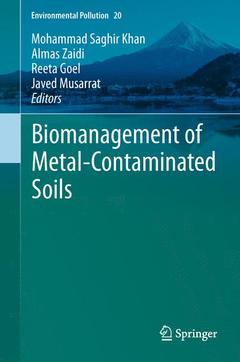Description
Biomanagement of Metal-Contaminated Soils, 2011
Environmental Pollution Series, Vol. 20
Coordinators: Khan Mohammad Saghir, Zaidi Almas, Goel Reeta, Musarrat Javed
Language: English
Subjects for Biomanagement of Metal-Contaminated Soils:
Publication date: 11-2013
518 p. · 15.5x23.5 cm · Paperback
Publication date: 08-2011
518 p. · 15.5x23.5 cm · Hardback
Description
/li>Contents
/li>Comment
/li>
Heavy-metal contamination is one of the world's major environmental problems, posing significant risks to agro-ecosystems. Conventional technologies employed for heavy-metal remediation have often been expensive and disruptive.
This book provides comprehensive, state-of-the-art coverage of the natural, sustainable alternatives that use a wide range of biological materials in the removal/detoxification of heavy metals, consequently leading to the improvement of crops in these soils. Novel, environmentally friendly and inexpensive solutions are presented based on a sound understanding of metal contamination and the roles of plants and microbes in the management of these toxic soils.
Written by worldwide experts, the book provides not only the necessary scientific background but also addresses the challenging questions that require special attention in order to better understand metal toxicity in soils and its management through bioremediation.
From the contents:
Heavy-Metal Pollution: Source, Impact and Remedies.- Metal-Plant Interactions: Toxicity and Tolerance.-Bioremediation: New Approaches and Trends.- Legume-Rhizobium Symbioses as a Tool for Bioremediation of Heavy Metal Polluted Soils.- Importance of Arbuscular Mycorrhizal Fungi in Phytoremediation of Heavy Metal Contaminated Soils.- Research Advances in Bioremediation of Soils and Groundwater Using Plant-Based Systems: A Case for Enlarging and Updating Information and Knowledge in Environmental Pollution Management in Developing Countries.- The Bacterial Flora of the Nickel-hyperaccumulator Plant Alyssum bertolonii.- Use of Biosurfactants in the Removal of Heavy Metal Ions from Soils.-Mechanism of Metal Tolerance and Detoxification in Mycorrhizal Fungi.- Metal Signaling in Plants: New Possibilities for Crop Management under Cadmium Contaminated Soils (...).- Index.




